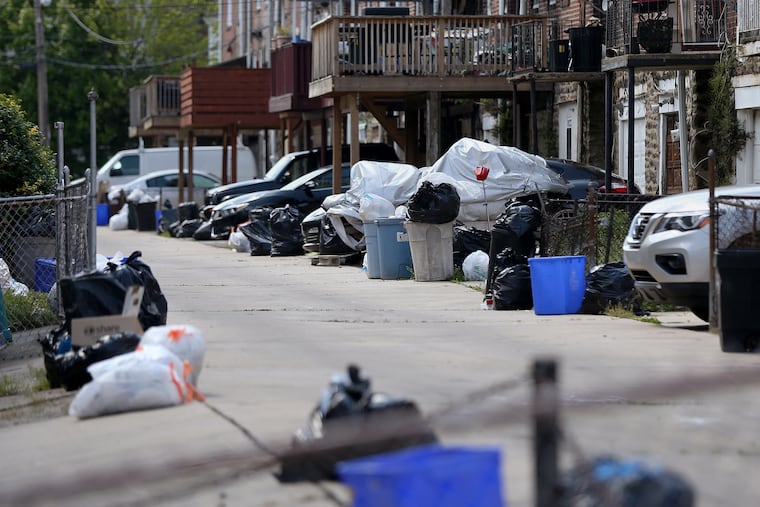Philly is so far behind on trash pickup that one City Council member calls it a looming ‘public health crisis’
The reason trash is piling up is clear: Sanitation workers are calling out sick in huge numbers. But there is contentious debate between the workers’ union and some city officials about why so many employees are missing work.

With garbage piling up on sidewalks across the city and the summer heat wafting the stench through neighborhoods and into homes, Philadelphians have been calling 311 to complain about uncollected trash so frequently that the service was unavailable for large stretches of this week.
Trying to catch up on the delays, which Mayor Jim Kenney’s office says range from two to four days, the Streets Department has temporarily instructed sanitation workers to throw recycled material in with regular trash, and is forcing some to work mandatory overtime shifts. The collection delays, which began shortly after the coronavirus pandemic reached Philadelphia, became so severe this week that one city councilmember is describing it as its own “public health crisis.”
The reason trash is piling up is clear: Sanitation workers are calling out sick in huge numbers. But there is contentious debate between the workers’ union and some city officials about why so many employees are missing work.
Leaders of AFSCME Local 427 say at least 100 of the city’s 1,100 sanitation workers have tested positive for COVID-19, and many more have had to self-quarantine after potential exposures. (The Kenney administration has refused to disclose how many city workers have been infected; other major cities regularly release those figures.)
The union leaders blame the problem on the city’s failure to provide workers with adequate personal protective equipment and on the nature of the job: Social distancing is impossible when three sanitation workers have to share a truck cab.
“The membership is coming to work. We’re encouraging the membership to come to work. But our problem is, we’re having more and more members test positive,” said Charles Carrington, president of Local 427.
But others think there’s more to the story. Councilmember Brian J. O’Neill called sanitation workers’ absences a “mini-strike” and said they are intentionally letting trash accumulate to pressure the city into giving them hazard pay for working during the pandemic. The union denies that there is an organized effort to keep workers from showing up.
O’Neill, a Republican who represents Northeast Philadelphia, wrote a letter this week calling on the Kenney administration to hire private trash collectors to fill gaps. Even threatening to do so, he said, could prompt better attendance.
“The extreme citywide delay in trash collection (now up to 5 days) has risen to the level of a public health crisis, with rats, mice, insects and outright stench on the streets of my district and other parts of the city,” O’Neill wrote. “I am calling on you to immediately hire outside trash collection companies to assist us in this crisis.”
Kenney, however, is an exceptionally labor-friendly mayor and would be unlikely to support a plan that would be cast as a union-busting tactic. The administration responded to the councilmember in a letter from Streets Commissioner Carlton Williams that did not acknowledge O’Neill’s suggestion.
Administration officials have not accused workers of calling in sick without reason, although the union believes that message has been implied and carried through back channels to Council. In April, Managing Director Brian Abernathy said, “You’d have to ask them why they’re calling out.”
Williams wrote that the delays are primarily due to workers missing time because they were infected with the virus or because they were exposed to it. Another factor is that Philadelphians are producing about 30% more residential garbage because they are home more during the pandemic, Williams wrote. Commercial trash is usually picked up by private collectors.
“From a planning perspective, the strain on resources and the variations in that strain make it nearly impossible to predict how far behind we will be each week, because the increases in tonnage fluctuate weekly and vary across the city,” Williams wrote. “This unpredictability coupled with the challenge of employee attendance and additional impacts of COVID really add up.”
Some of the stresses on the city’s trash collections are fueling themselves, Carrington said. For instance, staff shortages have made it necessary for some to fill in on crews they usually do not work with, increasing opportunities for the virus to spread among employees who otherwise could isolate from each other. Additionally, more workers are calling out with injuries because of the increased tonnage they are handling and because employees who are on the job have been required to work longer hours.
The city is asking residents to refrain from calling 311 unless their trash is not picked up for five or more days after scheduled times. It is also instructing them to leave their trash outside even if it was not picked up on time to ensure it is there when sanitation workers come by.
“The Streets Department thanks residents for their patience and apologizes for the inconvenience,” department spokesperson Crystal Jacobs wrote. “We truly understand the unsightly look and smell that results when having trash and recycling remain on the ground.”